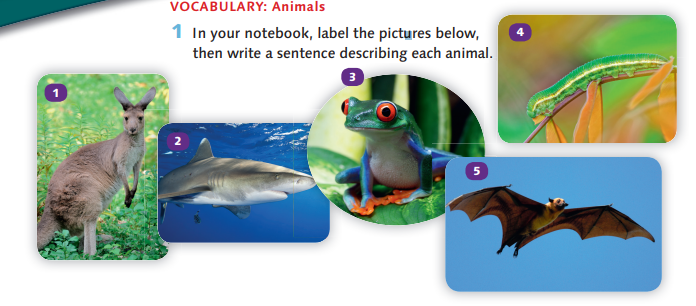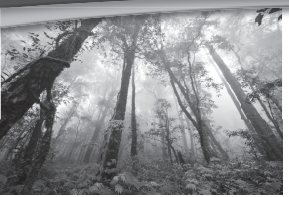Unit 1
Lessons 2-3
Student’s Book pages 13-14
GRAMMAR: The Present Perfect with yet and already
5 Answer these questions using yet or already to form complete answers.
1 Have you been to the art gallery?
No, I haven’t been there yet.
2 Have you read the book about the history of Jordan?
Yes,______________________________ .
3 Have you called your friend to check if he’s well?
No,_______________________________ .
4 Have you found your keys?
No,_______________________________ .
5 Have you booked your ticket to Dubai?
Yes,________________________________ .
Answers
1 No, I haven’t been there yet.
2 Yes, I have already read it.
3 No, I haven’t called him yet.
4 No, I haven’t found them yet.
5 Yes, I have already booked it.
Read the Hadith. Try to translate it into Arabic, and then explain what it means.
Prophet Mohammad (Peace Be Upon Him) said ‘‘There is none amongst Muslims, who plants a tree or sows seeds, and then a bird, or a person or an animal eats from it, but is regarded as a charitable gift for him.’’
Sahih Al Bukhari, V3, Agriculture
قال رسول الله صلى الله عليه وسلم "مامن مسلم يغرس غرساً، أو يزرع زرعاً، فيأكل منه طير أو إنسان أو بهيمة، إلا كان له به صدقة.
6 Use the Present Perfect and the words in brackets to write complete statements or questions.
1 I / visit / the Children’s Museum. (already)
I’ve already visited the Children’s Museum.
2 We / not finish working on the science project. (yet)
3 Nader / travel / to England. (already)
4 I / call / my mother. (already)
5 They / not save / the rainforests. (yet)
6 / you / see / their photographs? (yet)
Answers
1 I have already visited the Children’s Museum.
2 We have not finished working on the science project yet.
3 Nader has already travelled to England.
4 I have already called my mother.
5 They have not saved the rainforests yet.
6 Have you seen their photographs yet?
Speaking
7 Read the list of tasks that Sarah and Ali’s parents have left for them. What have they already done? What haven’t they done yet? Use the Present Perfect and already / yet. Work in groups.
Sarah
buy bread (✗)
tidy bedroom (✓)
put away plates and cups (✗)
do homework (✓)
Ali
do homework (✓)
set the table for lunch (✗)
return library books (✓)
tidy bedroom (✗)
Sarah hasn’t bought the bread yet.
Answers
Sara hasn’t bought the bread yet.
Sara has already tidied her bedroom.
Sara hasn’t put away the plates and cups yet.
Sara has already done her homework.
Ali has already done his homework.
Ali hasn’t set the table for lunch yet.
Ali has already returned the library books.
Ali hasn’t tidied his bedroom yet.
8 Work in pairs. What have you already done today? What haven’t you done yet? Use the Present Perfect and already / yet.
A: I’ve already packed my schoolbag for tomorrow.
B: I haven’t found a topic for my project yet.
Students’ own answers
VOCABULARY: Animals
1 In your notebook, label the pictures below, then write a sentence describing each animal.

Answers
1 kangaroo
2 shark
3 frog
4 caterpillar
5 bat
Students’ own answers
2 Write the names of the following animals in the correct column.
|
shark snake |
Insects: fly
Fish:
Birds:
Reptiles:
Mammals:
Amphibians:
Answers
Insects: fly
Fish: shark, ray
Birds: hummingbird, parrot
Reptiles: snake, crocodile
Mammals: monkey, bear
Amphibians: toad, frog
Listening strategies
Extracting main ideas
• Listen to the first question on the tape. It introduces the main ideas of the topic.
• Pay attention to linking words that might help you find the main ideas, such as because, in addition...
• You don’t have to understand all the details in the tape. Simply, look for the sentences that give the main ideas.
LISTENING
3 Listen to a radio programme about life on Earth. Which three things make up life on Earth?
Audioscript
Do you know why there is life on Earth? Well it is because there is water.
From space, Earth is a beautiful, blue planet. The colour blue is the oceans, which cover two-thirds of Earth’s surface.
Earth is different from other planets because its climate is suitable for humans, plants and animal species like insects, fish, birds, reptiles amphibians and mammals. The temperature is tolerable and doesn’t go from extreme to another.
In addition, oxygen is the gas that most living beings need for breathing. Trees and plants breathe out this air to provide it for other living beings.
Answers
Water, air and oxygen
4 Listen again and answer the questions.
1 Is the information provided in the audioscript fact or the speaker’s opinion? Explain.
2 What is the main idea of the listening passage?
3 How does the speaker describe planet Earth in his speech?
4 What is the importance of plants on Earth?
5 According to the speaker, life on Earth exists because there is water. Give two ways of conserving water on Earth.
Answers
1 The information provided in the audioscript is mainly fact; however, the speaker states their opinion when they describe Earth as “beautiful, blue planet”.
2 The main idea of the listening passage is to explain why life on Earth exists.
3 The speaker describes planet Earth as beautiful and blue.
4 Plants on Earth can serve as food and provide oxygen and water for animals. This makes them important for animals’ survival.
5 Ways of conserving water on Earth:
-Turn the tap off while you are brushing your teeth, washing your hands, etc.
-Start a campaign to raise awareness about the importance of saving water.
PRONUNCIATION
5 Listen to the words in the box. Notice the sound of the r at the end of the words. Repeat them.
|
spider discover equator their bear caterpillar |
Say programme. Is the sound of the final r the same as it is in the middle of the word?
Answer
No
Unit 1
Lessons 2-3
Activity Book pages 11-12
GRAMMAR
2 Choose the correct alternative.
a My uncle is an explorer. He has (1) yet / already been to some of the world’s most faraway places. He hasn’t been to the Amazon (2) yet / already, but he has (3) yet / already planned his trip there next year.
b A: I can’t believe you’ve (4) yet / already done all your homework! B: Well, I haven’t finished my maths (5) yet / already, but I have written my essay and I’ve (6) yet / already done my history. So I’m nearly finished!
3 Rewrite the sentences with yet or already.
1 I haven’t done my homework.
I haven’t done my homework yet.
2 The lesson has finished.
3 He hasn’t read the letter.
4 Have you read the book?
5 I’ve read it twice!
6 Have scientists discovered a cure for the common cold?
7 How many biscuits have you eaten?
8 I haven’t had any biscuits
VOCABULARY
4 Complete the text about rainforests with the nouns or adjectives from the box.
|
extinct insects logging volcano oxygen plants species |
Although rainforests cover only a small area of Earth’s (1)……………………… , they contain more than half of the world’s plant and animal (2)………………………. . Tropical rainforests breathe in carbon dioxide and breathe out (3)………………………. every day, so they help to keep Earth cool. As many as 30 million species of plants and animals live in the four ‘layers’ of (4)………………… rainforests. The tallest trees make up the top layer. There is a lot of sunlight here, and eagles, monkeys and butterflies live in the trees. Underneath this top layer, the lower trees form a ‘roof’ over the area below. The leaves, flowers and fruit that grow there provide food for monkeys, birds and amphibians like tree frogs. Not much sunlight reaches the third layer, so here plants have even larger leaves to reach the light. Many animals live here including jaguars and leopards, along with many tiny (5)…………………………… – ants and caterpillars. Lower down, on the forest floor, it is very dark and hardly any plants grow there – but it is home to the largest animals. Unfortunately, every year (6)…………………….. destroys around 200,000 square kilometres of rainforest. The rainforest and many of the creatures and (7)………………………. in it are in danger of becoming (8)…………………………………….. . We need to conserve this important and valuable part of our planet.

5 Find words in the text with the following meanings:
1 air that we breathe
2 cutting down trees
3 top layer of something
4 varieties or types of animals or plants
5 no longer exists 6 small animals with six legs
6 Read the words related to animals from the box and answer the questions.
|
monkey frog bear fly ray hummingbird shark parrot |
1 Which three can fly?
2 Which three can swim?
3 Which two have hair on their skin?
4 Which of the above animals is an insect? Use the word to write your own sentence.
Page 11, Exercise 2
1 already 2 yet 3 already 4 already 5 yet 6 already
Page 11, Exercise 3
1 I haven’t done my homework yet.
2 The lesson has already finished.
3 He hasn’t read the letter yet.
4 Have you read the book yet?
5 I’ve already read it twice!
6 Have scientists discovered a cure for the common cold yet?
7 How many biscuits have you already eaten?
8 I haven’t had any biscuits yet.
Page 12, Exercise 4
1 surface 2 species 3 oxygen 4 tropical 5 insects 6 logging 7 plants 8 extinct
Page 12, Exercise 5
1 oxygen 2 logging 3 surface 4 species 5 extinct 6 insects
Page 12, Exercise 6
1 hummingbird, parrot, fly
2 frog, ray, shark
3 monkey, bear
4 fly: Students’ own answers